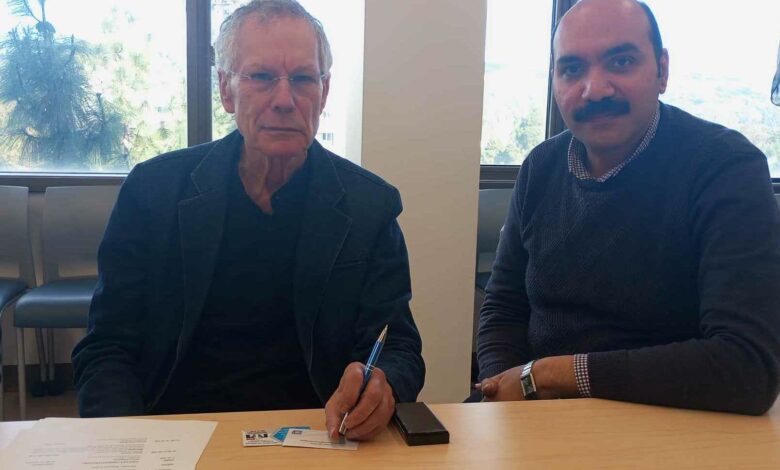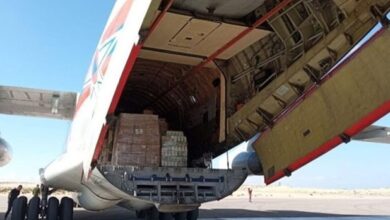
The Professor of Middle Eastern history at the University of California (UCLA) James Gelvin stressed his support for the waves of protests across American universities, but warned that they may impact the upcoming presidential election process.
In an interview with Al-Masry Al-Youm, Gelvin explained that Congress is studying a draft law that would classify some forms of anti-Zionist expression as anti-Semitic.
The university professor revealed his overall support for the demonstrations, as well as details of the evacuation of the protest camps and the means used by the security services. He also discussed his thoughts on Gaza’s future and how the university uprising may “threaten the presidential elections and freedoms in America.”
As a university professor, how do you view the protests at the University of California?
The student uprising and protests at the UCLA took the form of a camp in one of the open areas on the campus, surrounded by buildings. The demonstrators asked the university to withdraw its investments from companies that deal with Israel, and declared their solidarity with Palestine and the people of the Gaza Strip, which has been witnessing a war since October 7.
In the past, I visited the camp and spoke with the demonstrators hearing their demands, but I was not present during the two violent incidents that occurred after midnight on May 1.
Describe your impression of the two incidents, and how do you see the way the security services dealt with the demonstrators?
There were two violent incidents, one in the early morning of May 1, and the other in the early morning of May 2.
The first was an assault on the demonstrators’ tents, by outside agitators who were not students.
They came to the campus by bus and were organized. The demonstrators chanted taglines in support of Israel and the police, and tried to demolish the walls that the demonstrators had erected to protect their camp. They threw objects at them and physically assaulted the demonstrators.
The local police, campus police, and private security guards were present there, but they did not intervene, and the police waited three hours before they arrived, separating the attackers from the students.
The next night, around three am, members of the Los Angeles Police Department, the Los Angeles County Sheriff’s Department, and the California Highway Patrol began their attack on the camp.
They used tear gas and stun grenades, tore apart the camp’s tents and arrested over 200 demonstrators.
Were any of the demonstrators harmed during this incident?
Fortunately, no one was seriously hurt. Ironically, the demonstrators chanted during the police raid: “Where were you yesterday?” Then, the day after the raid, the university administration suspended most activities inside the campus, which started out quiet, but I doubt it will remain so.
As such, after a police raid on Columbia University in New York, students went up and took over one of the main buildings.
Lectures and classes at the UCLA will still continue for another month, so we’ll see what happens.
Graduate student staff have already scheduled a vote on whether to go on strike or not.
The protests snowballed one day and spread to universities in countries around the world. Will the world witness a student uprising or a tsunami? What impact will this have on policies?
I support students and participated in protests about civil rights and the Vietnam War in the 1960s and 1970s, so I have experience. It doesn’t matter much what happens on campus, what matters is what happens off campus. I encouraged students to leave campus and talk about Gaza in clubs, the Local Democratic Party, labor union halls, civic associations, etc.
I also asked the protesters to contact their local representatives, state and federal officials, as that is what will bring about change.
I understand from your words that the university protests may have an impact on the upcoming presidential elections?
The campus uprisings spreading across the US may affect politics and the upcoming presidential elections on November in two ways. The first is that young people may stay away from the polls instead of voting for the current US President Joe Biden, and this may have an impact in the disputed states such as Michigan, which has a large Arab-American population.
Already, 100,000 voters in the Democratic primaries have refused to support Biden.
Secondly – Donald Trump and the Republicans are using protests on college campuses alongside the chaos in the streets and the threat from the left, to showcase the collapse of “law and order”, just as former presidents Richard Nixon and Ronald Reagan did.
Paradoxically, then, the protests may be counterproductive.
Congress is in the process of issuing legislation affecting the nature of demonstrations. Will there be a law restricting freedom of expression?
Congress is considering a bill that would classify some forms of anti-Zionist expression as anti-Semitic. This means that some forms of anti-Zionist expression would be considered a violation of Jewish civil rights, which is illegal, and would likely be banned by university administrations, which depend on government funding.
Such expressions will meet objection and have an impact on freedoms.
Currently, what is your vision of the situation in Gaza after more than 210 days have passed?
The situation in Gaza is serious after about 35,000 people were killed, half the population faces famine, and most of its residents were displaced. The Israelis prevented medical and food aid and bombed civilian areas indiscriminately, to the point that Joe Biden himself protested.
Unfortunately, one of my former students is married to an immigrant from Gaza who has lost 50 family members since October.
Do you think that the Netanyahu government will fall and that Palestine’s Rafah will be invaded, and what if that happens?
We have to wait and see whether the Israelis will attack Rafah or not. They are under tremendous pressure from governments around the world, as well as the United Nations, not to do so.
But there is another factor at play here, which is that Israel has two official war goals: the destruction of Hamas, and the release of the Israelis captured by Hamas fighters since October 7. The first goal of the war is impossible, as many Gazans depend on Hamas, which is the largest party, for employment in Gaza.
As for Israel, it cannot spend the same time and money that the Allies spent after World War II to “cleanse” Germany of “Nazism.”
What are your expectations for the fate of the war?
I think that at some point the Israelis will declare victory and leave, but in addition to the two official goals, there is a third unofficial goal: keeping Netanyahu out of prison, and this can only be achieved if Netanyahu’s government can survive, and this means that the Israeli decision-making process falls into the hands of the craziest and most extreme members of Netanyahu’s government.




